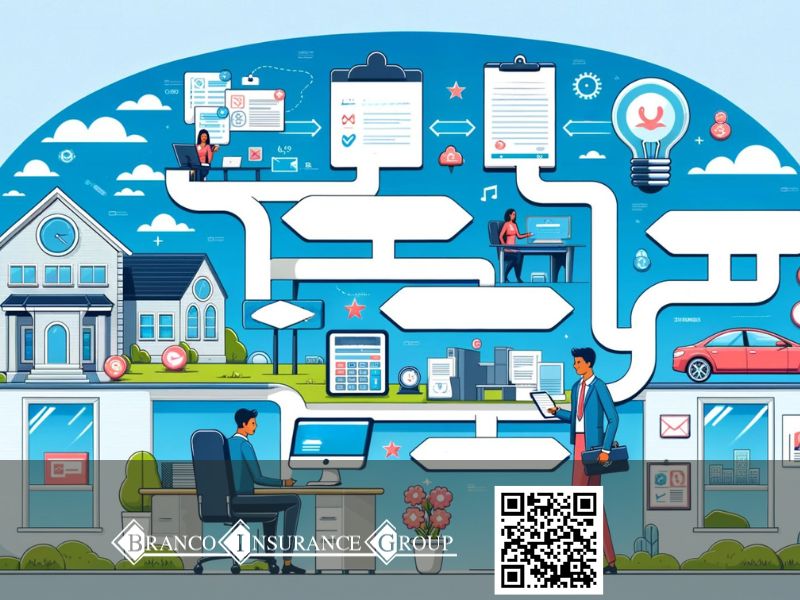Getting an insurance quote marks the first step in securing financial protection. But with many types of policies, countless providers, and a maze of online platforms, the process can seem daunting. This comprehensive guide breaks down everything you need to know to get accurate, affordable insurance quotes with ease.
Key Takeaways About The Insurance Quote Process
- Quotes provide estimated premium costs for tailored coverage based on applicant risk factors
- Getting quotes from multiple companies ensures finding affordable pricing
- Look beyond just dollar amounts when judging policy offerings
- Independent agents access more carriers to match specific needs
- Improving insurance credit scores saves money over the long run
- Enroll in defensive driving courses to lower auto premium quotes
- Discuss worst-case scenarios with agents to determine sufficient coverage limits protecting assets
Shopping around for personalized quotes remains the surest way to secure complete insurance protections while simultaneously cutting costs. Use this guide’s tips during your search to master the process from start to satisfying finish.
What Is An Insurance Quote and Why Do You Need One?
An insurance quote estimates how much you’ll pay in premiums for a specific policy. Quotes factor in details about you, your property, and the coverage sought to arrive at a personalized price.
Gathering quotes from multiple companies allows you to:
- Compare rates on identical policies
- Ensure you get the right amount of coverage
- Find the best fit for your budget and needs
- Verify you’re paying a fair price
Without shopping around, you risk overpaying for insurance or buying insufficient protection.
Types of Insurance Quotes
Insurers provide quotes for various policy types, each requiring specific personal and property details that determine pricing.
Auto Insurance Quotes
Auto insurance quotes indicate how much you’ll pay to insure a vehicle based on criteria like:
- Driver age, gender, location, and driving history
- Vehicle make, model, age
- Coverage types and claim limits
Insurers also consider credit scores, mileage, anti-theft devices, and more when pricing auto policies.
Home Insurance Quotes
Home insurance quotes account for details including:
- Location
- Square footage
- Construction materials
- Age of home
- Protective systems installed
The value of possessions and desired coverage limits also impact homeowners insurance pricing.
Life Insurance Quotes
With life insurance, quotes weigh factors such as:
- Age
- Family health history
- Lifestyle risks like smoking
- Beneficiary designations
- Length of policy
The younger and healthier you are, the less you’ll pay for the same death benefit amount.
Health Insurance Quotes
For health insurance, quotes indicate costs based on criteria like:
- Household size
- Location
- Income level
- Desired plan type
You may also qualify for tax credit savings, reflected on marketplace plan quotes.
Where To Get Quotes
You can obtain quotes directly through insurers, from comparison sites, or using an independent agent or broker.
Directly From Insurance Companies
Most insurers today offer online quoting tools and contact forms to request quotes. This allows you to go straight to the source and shop policies from leading national and regional brands.
Large carriers with recognizable names typically offer a range of products. Start by getting quotes from companies like:
- State Farm
- Allstate
- Farmers
- Travelers
- Liberty Mutual
- Progressive
- Geico
Direct shopping simplifies quote gathering but limits your choices. An independent agent accessing multiple insurers may find you cheaper rates.
Insurance Comparison Websites
Aggregator sites like The Zebra, Policygenius, and Insurance.com compile quotes from partners after you fill out one form. This saves time researching individual companies.
Comparison platforms often attract new or less satisfied customers by advertising extremely low sample quotes. Make sure any policy meets coverage needs before purchasing solely on price.
Independent Insurance Agents
Independent agents and brokers access policies from multiple companies instead of just one, like captive agents. This expands your quote options and chances of securing very competitive pricing.
Indie agencies also provide personalized service guiding you to adequate coverage appropriate for your situation. Large direct insurers lack touchpoints with local representatives.
Key Quote Details To Compare
While premium costs rightfully receive attention, insurance quotes contain other critical details to factor into your decision beyond just dollar amounts:
Coverage Limits
Pay attention to liability caps, benefit maximums, and sublimits when judging quotes. Higher coverage better protects your assets in worst-case loss scenarios.
Deductibles
While lowering deductibles drops monthly premiums, it means paying more out-of-pocket for claims before your policy contributes. Set deductibles high enough to keep premiums affordable but not so high claims become financially devastating.
Discounts
Compare any discounts or savings opportunities offered by insurers when analyzing premium differentials. Just a 5% discount on an otherwise more expensive policy could make it the cheaper option overall.
Added Features
Look for free extras like accident forgiveness programs or loyalty rewards when contrasting offerings. Perks like identity protection services for customers provide additional value beyond base insurance.
Thoroughly examining these components prevents focusing narrowly on sticker price when selecting coverage.
How Insurance Companies Calculate Quotes
Insurers apply proprietary rating criteria and algorithms weighing dozens of data points to precisely gauge risk levels posed by applicants. This determines the premium prices issued on quotes.
Common personal factors utilized by insurance underwriters include:
- Age: Younger drivers and homeowners pose greater claims risks, raising prices.
- Driving history: Incidents like accidents and DUIs mean much higher auto premium quotes.
- Credit scores: Poor credit correlates with irresponsible behavior in insurers’ eyes, inflating premiums.
- Location: Areas with more accidents, crime, severe weather events, or liability lawsuits increase policy pricing.
- Marital status: Married couples often receive cheaper quotes thanks to perceived stability.
- Gender: Stats show young males cause the most wrecks, spiking their car insurance rates.
- Insurance scores: Custom metrics weigh credit and other factors, impacting premiums like regular credit scores.
Vehicles also contribute heavily to auto insurance quotes based on criteria like:
- Make and model: More crashes, thefts, or repair costs for a particular vehicle make it more expensive to insure.
- Age: Brand new models cost more to replace and fix than older cars.
- Safety ratings: Poor crash test results can raise liability risks and premium prices.
- Security features: Anti-theft tech like vehicle tracking helps lower quotes.
Additionally, insurers apply:
- Mileage driven: More time on the road means higher accident exposure for a policyholder.
- Purpose of use: Commuting vehicles cost less than those hauling passengers for business or ridesharing services.
For homes, critical rating factors encompass details like:
- Building construction materials: Wood frames make poorer risks than brick.
- Location: Coastal regions facing floods and hurricanes have pricier underwriting.
- Age of home: Brand new properties require fuller replacement cost coverage.
- Protective systems: Smoke alarms, fire suppression equipment, and security systems lower risk.
Insurers invest heavily in sharpening rating techniques to pinpoint rates reflecting projected loss experiences for narrowly defined customer segments. This allows passing maximum savings to lower risk applicants via discounts ultimately reflected on quotes.
When To Shop Quotes and Switch Carriers
Every 1-2 Years
Mark your calendar to compare competing quotes around the time your policy renews to ensure pricing remains competitive each year. Over time, other carriers may lower rates benefiting customers while your current insurer slowly increases premiums counting on loyalty and inertia.
After Major Life Events
Getting married, moving homes, adding teen drivers, and acquiring costly assets all significantly alter risk profiles. These occasions call for reassessing coverage with updated quotes. New discounts may now apply to your situation.
Following Negative Driving Events
Accidents, traffic violations, and license suspensions adversely impact pricing. New quotes determine if other insurers weight these incidents less severely when setting rates. Just one carrier may still offer you decent savings.
Improving Your Insurance Score
Like regular credit scores, insurance scores greatly influence premium quotes across many policy types. Safely boosting your score saves money at renewal time when carriers reevaluate rates.
- Check your insurance score: Experian provides free monthly access to track your score alongside helpful tips for improving it. Monitor changes over time.
- Pay bills on time: Payment histories make up the largest portion of most insurance scores. Stay on top of electric, phone, rent payments and avoid collections.
- Lower credit card balances: High revolving utilization on cards hurts. Pay down balances and use credit judiciously.
- Limit credit applications: Each application dings scores temporarily. Space out new credit over time; don’t open multiple cards at once.
- Correct reporting errors: If your credit reports show accounts that don’t belong to you or payments marked late inaccurately, file disputes requiring investigation by credit bureaus. This protects your insurance score against flaws dragging it down.
- Enroll in utility rewards programs: Signing up for these bonus programs builds positive payment references with gas, power, and water services boosting your history’s diversity.
- Practice safe driving: Obey speed limits, allow proper following distance, and avoid distractions to keep clean motor vehicle records pivotal for the best car insurance rates.
Choosing The Right Insurance Coverages
All the insurance quotes in the world won’t provide sufficient protection later if policies lack adequate coverage limits or types during initial purchase.
Consider Possible Worst-Case Scenarios
Imagine your brand new $40,000 vehicle gets stolen and stripped entirely for parts. Or envision a bad storm with 70 mph winds uproots a tree crashing through the roof of your home.
In these extreme situations, minimum liability requirements and high deductibles could still leave you footing huge bills out-of-pocket. Run worst-case scenarios when selecting optimal coverage to hedge all bases.
Account For Rising Inflation
Construction, labor, medical, and vehicle replacement expenses inch higher each year. Review policy limits occasionally to ensure still sufficient to fully replace damaged assets or cover injuries given inflation. Reports indicate homeowners claims now average around $15,000.
Discuss Needs With An Independent Agent
Captive agents sell products from just one carrier lacking perspective about competitor offerings. Independent brokers access larger markets better positioning them to match specific policies to your unique situation. Schedule a consultation outlining objectives allowing professionals to assemble optimal protections.
Bundle All Insurance Together
Maintaining multiple policies with the same provider produces bundling discounts lowering premiums across combined accounts. Combine home and auto, renters, boat, motorcycle etc. for maximum savings beyond individual insurance quotes.
Bolster Safety Efforts
Add defensive driving courses, equip homes with modern alarm systems, and employ loss prevention best practices to qualify for all available policy discounts and enhanced protections. Discounted premiums offset initial safety investment costs over time through ongoing savings.
Final Thoughts
As you can see, Branco Insurance Group has a long history of providing exceptional service and coverage to families and businesses in Connecticut. Our experienced agents take the time to truly understand your unique needs so we can find the right insurance solutions.
Whether you need to insure your home, auto, boat, or business, we have the relationships with top-rated insurance companies to get you the best rate. And as an independent agency, we can offer unbiased advice to help you make the right choices.
We invite you to join the hundreds of satisfied customers who trust Branco Insurance Group to protect what matters most. Contact us today or stop by our office in Naugatuck to meet with an agent. We’ll review your current coverage, identify any gaps, and provide customized recommendations so you have the peace of mind you deserve.





